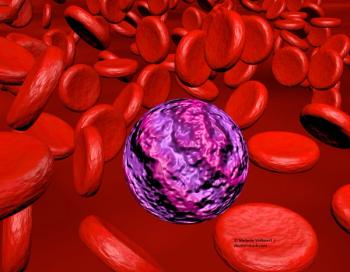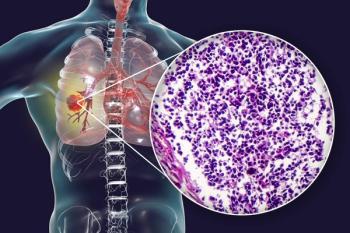
Sotorasib plus panitumumab may offer improved survival compared with previously approved treatment options in KRAS G12C-mutated colorectal cancer.

Your AI-Trained Oncology Knowledge Connection!


Sotorasib plus panitumumab may offer improved survival compared with previously approved treatment options in KRAS G12C-mutated colorectal cancer.

Hematologists gathered to discuss recent updates on bispecific antibodies surrounding patients with relapsed/refractory multiple myeloma.

In the phase 2 TRANSCEND FL trial, lisocabtagene maraleucel met its primary end point of overall response rate in patients with marginal zone lymphoma.

Marginal Zone Lymphoma experts discussed recent advancements in all areas of MZL, while calling attention to gaps in knowledge in the 2024 MZL Scientific Workshop.

Experts from Washington University in St. Louis discuss trial results and infusion-related reaction management for amivantamab in EGFR-mutated NSCLC.

A population-based study led by Cedars-Sinai investigators found that thyroid cancer continues to be overdiagnosed, while the risk of dying from the disease has remained the same.

A retrospective systemic literature review showed that increased lines of therapy led to decreased HRQOL in patients with relapsed/refractory myeloma.

The panel discussed the different ways to treat patients with HER2-positive metastatic breast cancer who also have brain metastases.

Following promising results from a trial investigating the effects of 225Ac-SSO110 on Balb/c nude mice injected with the xenograft model of SCLC, IND clearance was granted by the FDA.

Risk model data may provide reassurance for individuals undergoing hormone therapy with an already heightened breast cancer risk due to family history.

Alexander Spira, MD, and Julia Lazo, RN, spoke with Melinda Reubens, who was diagnosed with EGFR-mutant NSCLC, and her husband Justin.

Completion of the phase 1 first-in-human trial revealed that iPSC-derived CAR natural killer cell therapy has potential for development across oncology.

The decision impacts the phase 1 STARLING trial and additional phase 1 trials sponsored by the Moffitt Cancer Center evaluating TIDAL-01 in solid tumors.

Ziftomenib elicited positive responses in patients with NPM1-mutant acute myeloid leukemia, meeting the primary end point of the phase 2 KOMET-001 trial.

Thomas Habermann, MD, discusses the significance of the MZL Workshop and its contributions to advancing research and improving outcomes.

“We have huge amounts of work to do to maximize the efficacy of immunotherapy,” Christine Bestvina, MD, said during an interview with CancerNetwork.

All 9 patients in a phase 1 trial testing a neoantigen-targeting personalized cancer vaccine in renal cell carcinoma had no recurrence at data cutoff.

Findings from RedirecTT-1 show responses across different dose levels of talquetamab/teclistamab among those with multiple myeloma.

Julie M. Vose, MD, MBA, discussed MZL research and future directions in the February Letter to Readers.

Phase 2b data support the Regenerative Medicine Advanced Therapy designation for gemogenovatucel-T in newly diagnosed advanced ovarian cancer.

Radiotherapy plus camrelizumab and platinum-doublet chemotherapy showed manageable toxicity in untreated non–small cell lung cancer with brain metastases.

Christine Bestvina, MD, stated that the presence of EGFR and ALK mutations can affect the way that a patient will react to treatment and should be factors that physicians consider.

The safety profile of pembrolizumab plus neoadjuvant chemotherapy was consistent with the known profiles for each treatment.

The diagnostic accuracy of radiologists aided by the eyonis LCS AI software was greatly improved compared with when radiologists were unaided.

6-thio-2’-deoxyguanosine sequenced plus cemiplimab elicited an OS of 16.9 months in the third-line setting for patients with advanced non–small cell lung cancer.

“We need some longer-term overall survival data to help discuss with patients the best treatment of choice for them,” Christine Bestvina, MD, said.

A greater proportion of excellent responses were reported without radioiodine than with radioiodine when treating patients with low-risk thyroid cancer.

Clonal hematopoiesis may be associated with the early development of toxic events in patients with newly diagnosed multiple myeloma.

Adagrasib elicited higher efficacy in combination with mTOR inhibitors vs alone when treating patients with KRASG12C-mutant non–small cell lung cancer.

Additional local, regional, or national policy may bolster access to screening for colorectal cancer, according to Aasma Shaukat, MD, MPH.